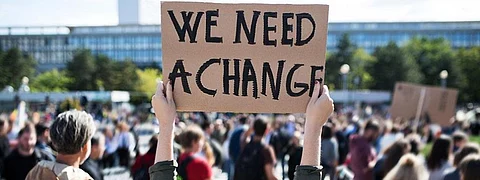

We are hurtling towards the certain disaster of a 4°C warmer world. New national climate targets next year must match the scale of the problem. The ability to limit warming to 1.5°C becomes harder the longer governments delay action.
Against this background, governments will negotiate the sticky issues of accounting for carbon trading and the mechanism for addressing loss and damage at the United Nations Climate Change Conference, or Conference of Parties (CoP), in Madrid, Spain.
There is sometimes a cognitive dissonance between the high-level discussions — usually painstakingly slow and deliberate to the last detail — among bureaucrats at the climate conferences and the urgency for action that we see on the streets. But even inside the ‘CoP bubble’, it will be hard to ignore the headlines from the ongoing demonstrations in Chile, Iraq, Lebanon and Hong Kong.
The roots of the climate crisis are inextricably linked to unbridled capitalism, growing inequality and unemployment, unjust policies that burden the working class while reward rich polluters, corruption and the lack of basic amenities like clean water and air.
A failure to connect the dots on tackling climate change with broader social justice and human rights issues will render even well-intentioned policies useless or harmful.
Climate multilateralism is on shaky ground but these summits remain the only formal international space to keep climate change on the global agenda, to push for progress and to hold governments to account. They are critical for small island states and developing countries to demand more from rich countries who have contributed disproportionately to the crisis and evade responsibility.
Activism comes in many forms. Combing through dense text in legalese, spotting a missing word here or convoluted phrasing there, raising the alarm over language that waters down commitments — these are as important as marching on the streets.
Ultimately, it is vigilance and pressure from people — on the streets and in negotiating rooms — that will keep the feet of politicians to the fire to deliver on climate action.
(The author is senior communications officer at the Climate Action Network International)
This is part of Down To Earth's print edition dated December 1-15, 2019
To read more on the ongoing Conference of Parties 25 click here